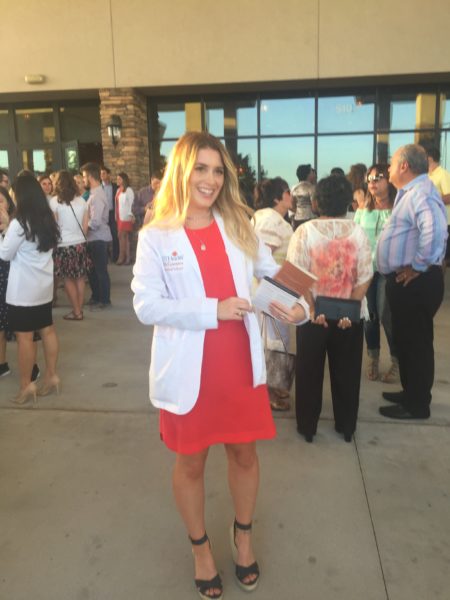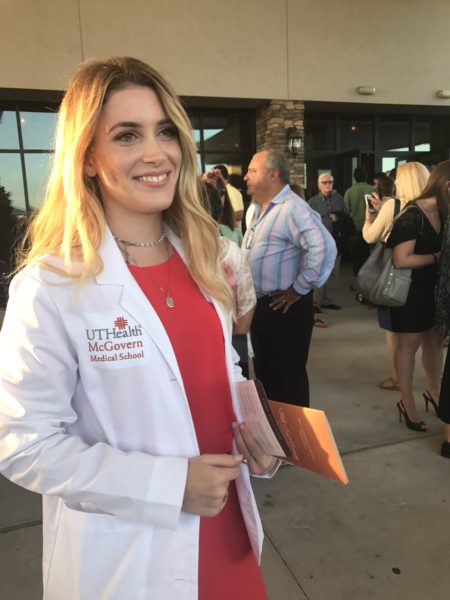Annika’s White Coat Ceremony was awesome. My heart swelled with pride as she donned her white coat for the first time on stage. She has worked so hard to maintain a perfect grade point average. Here’s a video of part of the ceremony:
and some pics of the lovely girl:


And now for the last in our series on stress:
Me: Okay. There are a couple more things I want to ask before we close. One is collective stress. Is there such thing as collective stress for the entire collective?
Erik: Oh, yeah, Mom!
Me: It’s going around right now!
Erik: Think of it like a blanket. So there’s a universal pool of consciousness that’s like a blanket around the whole globe. Because we’re all a part of that pool of consciousness, we’re constantly feeding into it.
Kim: He’s getting really deep into why we have mental illness because of this.
Erik: Sometimes our antenna is turned on and connects and we pick up something from somewhere else. All of a sudden we’re experiencing things like, “Oh gosh. This is a new feeling.” And then we react and so on. Because we are One and all connected, we have the ability to come in and out of that consciousness and feel other people’s thoughts and emotions. The trick is not to become it. We can feel it. We can be aware of it—
Me: But say, “Hey, that’s not mine. That’s somebody else’s.”
Erik: Yeah.
Kim: Elisa, I can’t believe you said that because before I had that event on Saturday, I spoke to a friend that was going to be there, too. She wasn’t an army wife, though. She’s a psychic. She’s a spiritual friend, and she said, “My guides are telling me to tell you to remember during the ceremony to ask yourself, ‘Is that mine, or am I feeling something from someone else?’” We were jam packed, shoulder to shoulder, and everybody was sobbing. So I sat there in this sobbing crowd and I’m like, ‘It’s okay.’
Me: Yeah, you identified your own feelings separate from everybody else. That’s not that hard to do. You just have to be conscious and present, and then you can easily see, “Oh, this is not my feeling. Keep it to yourself!’
Kim: Exactly. Ask yourself that on a continual basis. Having that awareness is strong enough to dissolve away from you stuff from other people.
Erik: Because we are One, we can feel, but we don’t have to become.
Me: What can we do about collective stress?
Erik: Two things. When we feel and pick up on collective stress and we’re in that situation, we can make a conscious choice to not react, not be affected by it and kind of like remain in neutral. That will help us on a personal level. But we can also choose to emit positive energy, love to help bring it to something better. You have to be brave enough because remember what we were saying before how negativity is contagious?
Kim: Sometime we’re going to have to do a whole session on why negativity is more contagious than positivity.
Me: Oh, interesting.
Kim: You see that. When someone starts bitching about something, someone else will chime in and then someone else will chime in. And if you’re the odd duck and go, “Well, it’s really not that bad. Look at it like this,” then all of the others are going to go, “Why aren’t you joining in on our bitchfest?
Me: I know! Really!
Erik: You have to be brave enough to introduce that whole shift in perspective. Whether you do it verbally or energetically is up to you.
Me: I know, Erik, that you taught us to send white light or loving energy to the core of Mother Earth, then let that shoot out to the crust and enter the soles of everyone in need and all the living creatures. Emanate it and let it heal.
Erik: I want you to think about this, too. You brought up the earth—
Kim (Looking around at the floor): I’m looking to see—there was a spider crawling around on the floor towards me and now I can’t see it!
Me: Oh, no! That’s scary! I’d rather see it.
Kim: I saw it earlier and I’m like, ‘Hey there!’ I’m in this place where I can’t squash it anymore. I should have taken him outside; now I don’t know where he is.
She laughs nervously.
Erik: I want you to look at it like this: When you look at the trees, the earth and the plants, look at their level of consciousness and the fact that they just are. They’re just in existence. They just be. That’s what they do. They be. They don’t react, of course, because their consciousness is at a different level. It’s a pure state of presence. If you were to ask the tree, “Are we in the present? Are we in the Now?” the tree has no option but to be in the now. Understand the purity of that life force. Look at the earth as your source of restoration and renewal. So, yes, be a channel for that and continue to put that back into the earth. Just as much as you bring down and put in, utilize that, too. That’s why you’re here. That’s why we live on Earth in such a pure place where the trees just exist. They don’t react and they don’t have judgments.
Me: So, be a tree!
Kim (Laughing): I love that.
Erik: It’s just pure life force happening without judgment, without expectation. It’s just existence. Look at the purity in that and let that help you. In utilizing that, know how you’re affecting the collective of mankind and also the collective of the earth. If you walk the earth thinking that your energy doesn’t affect it or that you’re just one person and can’t make that much difference, I got news for you. It makes way more difference than you think.
Me: Okay. All right, to wrap it up, can you give me 4 or 5 practical tips on how to avoid and/or alleviate stress? Just some bullet points.
Kim (Smiling): He drew a bull’s eye on the floor and he goes, “Bing” (She mimics dropping something on the bull’s eye.)
Erik: The bull’s eye represents being present. Try to practice that as much as you can.
Me: So, be a tree.
Erik: Be a tree.
Me: Or a spider.
Kim laughs and looks around the floor nervously.
Erik: Write this one down: I have a choice. I want you to look at that. Every time you start to freak out or stress about something, remember that number one on the list is “I have a choice. I have a choice to stress, to accept, to take action and make a change and stress doesn’t change a damn thing.” Number two: It’s about the identity. Everybody that stresses knows they don’t like it and that it doesn’t feel good. So look at the identity you’re creating in stress. Do you want this to be your identity? That goes back to the choice factor.
Kim: Just like with that one army wife, she was choosing. Her whole identity shifted and she’s now defined and identifying herself in fear.
Me: She’s The Fearful Army Wife. That’s her identity.
Kim: Yes, and she’s suffering terribly in so many ways.
Me: Aw.
Erik: It’s the way we associate our identity with stress. Look at how you’re identifying yourself. So number two: Identity—it’s a choice. Number three—
Kim: He puts a lot of emphasis on this. Let’s see what he says.
She listens for a while.
Kim: It’s about compassion, actually. He hasn’t talked about this yet. He’s giving this a lot of compassionate energy.
Erik: Every time you identify stress in your life—
Kim: There’s that spider! I found it! At least I know where it’s at.
She laughs.
Me: Good!
Erik: You have to have compassion with yourself because if you criticize yourself for being stressed, it becomes a cycle like you react negatively and you’re angry with yourself because, “Oh god, I stressed again. Why can’t I get it right?” Have compassion in everything you do with yourself because even if you are going through the shittiest of time and are trying to feel the emotions and get through it, have compassion with the way you’re dealing with it. Compassion is the gateway to the ability to adapt to change.
Me: Oh!
Erik: If you have compassion with yourself in it—it just goes back to resistance. If you resist yourself by being critical of yourself, you’re not really fostering any kind of change that’s positive for you that will lead to a positive life. So if an army wife goes, “Oh my god. I can’t believe I was so consumed, and I can’t believe I cried. That’s so stupid. It’s not a big deal,” she’s just perpetuating the stress. It’s the same energy, Mom.
Me: It’s kind of the same energy as resistance.
Erik: Compassion is not the same energy.
Me: Compassion is more like allowing. It’s along the same energetic vibrations as allowing things to be.
Erik: Right, and compassion can change things. It has the ability to transmute something, energetically. So when you look back and have compassion with yourself, you transmute stress’s hold on you. When fear has a grip on you, if you have compassion with it, you change its grip. You soften its grip a little bit. Then you transmute your whole self and that leads to a higher and higher vibration. So practice compassion. That’s number three.
Me: Okay.
Erik: That completes my list.
Me: Okay.
Erik: And have compassion for others, too. If you see they’re struggling with their stress, have compassion for them even if you understand the mindset that stress is chosen and they have a choice just like you do. Even if you know that for someone else, have compassion because they’re at a difference level of consciousness than you.
Me: That’s true, and sometimes people are the instigators of our stress or at least we allow them to stress us out. But sometimes if we look at them with eyes of compassion, then they don’t stress us out as much. Maybe they’re being an asshole because they’re really struggling in life. Sometimes the people who are hardest to love and the ones who need it the most. So if you can take those “villains” in your life and look at them with compassion and try to understand them, then that can minimize your stress, too—and maybe theirs!
Erik: Compassion creates unity, and when we have unity, there’s no room for stress.
Me: Yeah.
Kim: He’s kind of speaking in like worldly terms. He’s getting really soft.
Erik: I just want you guys to think about that. So show compassion, however you can exercise it. If you think you’ve exhausted it, there’s always more. It never runs dry.
Me: That’s true. Anything else, Erik, before we close?
Erik: No, I just like watching Kim squirm because of the spider.
Me: And the stool! Oh, my gosh.
We close with Kim sharing a little about what’s going on in her life and information on how to connect with her.
Next stop: Fort Stockton. A 10 hour ride to the campsite.



